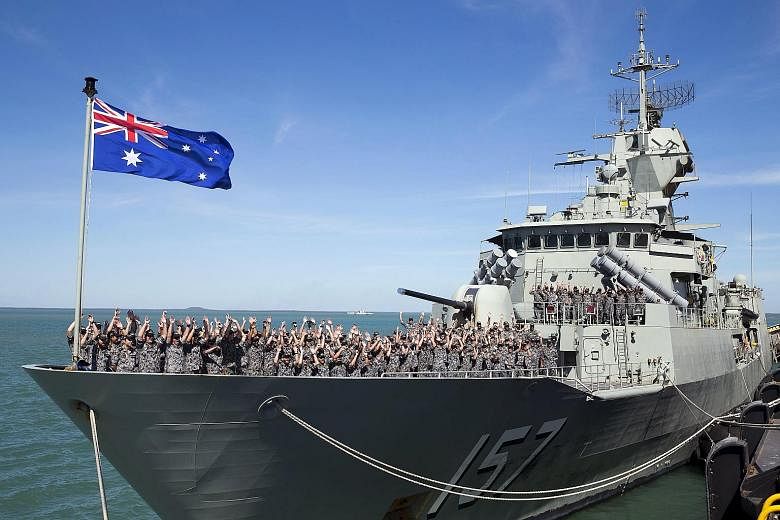SYDNEY • Australia will spend A$89 billion (S$90 billion) on ships and submarines for its navy over the next 20 years, Prime Minister Tony Abbott said yesterday, with A$40 billion of that earmarked for building surface ships domestically.
The government expects the "continuous shipbuilding" proposal, which involves the replacement of frigates and patrol boats, to retain up to 2,500 jobs.
Two naval shipbuilding programmes, the A$20 billion SEA5000 Future Frigate project and the SEA1180 Offshore Patrol Vessels, will be brought forward to guarantee the continuous domestic construction of surface warships.
"The fundamental thing that we have done today is ensure that we don't just have a ship build in Australia, we have a fleet build in Australia," Mr Abbott said in Adelaide, South Australia's capital.
The announcement is seen as an effort to assuage voters in South Australia, the state with the highest jobless rate at 8.2 per cent and home to most of the country's major shipbuilding infrastructure.
A decision on an international supplier for replacement submarines will be made "in coming months", said Mr Abbott, who is facing intense pressure from within his conservative Liberal Party and the Labor opposition to ensure the A$50 billion stealth submarine programme, Australia's biggest-ever defence procurement deal and one of the world's most lucrative defence contracts, is centred at home.
He would not give new details about the ongoing search for an international supplier to design and build the next generation of submarines to replace its ageing diesel- electric-powered Collins Class fleet, set to be retired from about 2026 onwards.
The bidding process has been a source of contention amid concerns that the domestic shipbuilding industry could be fatally hurt if Canberra chooses to buy off-the-shelf submarines internationally.
ThyssenKrupp (TKMS) of Germany, France's state-controlled naval contractor DCNS and a Japanese government consortium of Mitsubishi Heavy Industries and Kawasaki Heavy Industries are bidding for the submarine contract.
TKMS is wooing anxious members of the government with the economic and political benefits of its proposal amid concerns that awarding the contract overseas could result in major political repercussions.
A Japanese government team is in talks with Britain's Babcock International Group and BAE Systems, Reuters reported last month, in response to Australia's desire to have as much domestic participation in the project as possible.
Mr Abbott is also eager to deepen security ties with Japan, reflecting a US desire for its two allies to take a bigger security role in Asia as China's military might grows.
"What we have asked the various potential partners to give us is a price for a domestic build, a hybrid build and offshore build," he said.
AGENCE FRANCE-PRESSE, REUTERS

